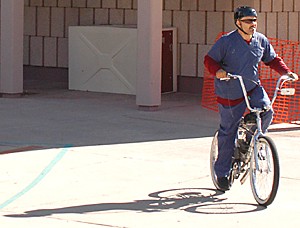The cost of gasoline and the summer’s heat are among the factors leading many Tucsonans and UA students to embrace motorized bicycles, but Tucson City Council members are still trying to evaluate whether the bikes should be banned or not.
The rides in question are the vision of a local company, Spooky Tooth Cycles, 657 W. St. Mary’s Road, which manufactures 26-inch, gas-powered bicycles, with speeds that top out around 20 mph.
The Spooky Tooth creations are traditional bicycles fitted with a two-stoke engine, which are found in lawn mowers, jet skis and other devices.
“”It’s transportation that makes sense,”” says communication senior Drew Williamson.
Williamson said his Spooky Tooth bike gets him to and from his job at the Arizona Inn faster and dryer than pedaling a traditional bicycle outside in the summer heat.
“”With this heat it’s often hard to ride to work, and you want to show up presentable,”” he said.
Affordability and 150 mile-to-the-gallon efficiency were his main reasons for owning one of the bikes after he gave up his car, Williamson said.
“”Obviously, they’re fun,”” Williamson said.
But city council members are evaluating whether the inexpensive transportation poses a threat to public safety.
The recently-passed House Bill 2796 in the Arizona Legislature allows the Spooky Tooth-style rides to fall under regulations similar to traditional bicycles, granting them use of bike lanes and freeing owners from licensing requirements.ÿ
However, local legislators are free to pass additional laws concerning their usage.
Members of the Tucson City Council examined their options concerning the bikes during a July 11 meeting attended by an often-raucous throng of Spooky Tooth supporters.ÿ
City officials, along with representatives from the Tucson Police Department and the Tucson-Pima County Bicycle Advisory Committee, examined three avenues – to do nothing and allow the legislation to stand, to require licensing or to make the bicycles illegal altogether.
On the UA campus, the operation of motorized bikes has special significance, where the sound of footsteps and conversation, often the early warning of oncoming pedestrians, might be drowned out by engine noise.ÿÿÿÿÿ
“”Safety, security and convenience don’t always go hand-in-hand,”” said UA Police Department Cpl. Christopher Schoepner.ÿ
Schoepner cited the unique traffic issues found on college campuses that could hamper the operation of Spooky Tooth bicycles on UA bikeways, such as heavy foot traffic and disabled persons.
During the 1990s, a UA professor was killed in a bicycle-pedestrian collision.ÿ The accident made the walking of bicycles mandatory under the Olive Street underpass, where the incident occurred, said Schoepner.
Officer Frank Romero, crime prevention specialist for UAPD, says that while the department policy toward motorized bicycles allows both engine and pedal powered bikes in the bicycle lanes, Spooky Tooth riders, like all bicyclists, should use care with regards to the speeds the bikes can attain.
“”It’s important to exercise due regard and caution with respect to the environment you’re operating within,”” said Romero. “”Pedestrians aren’t always looking both ways before they cross around here.””
Kyle Colavit, a master’s candidate in mechanical engineering who serves as the president of the UA Cycling Club, is ambivalent about the effects of the powered bikes on campus.ÿÿÿÿÿ
“”I think they’re a good alternative to driving around in cars,”” said Colavit. “”But it could be dangerous – there’s a lot of people who don’t follow the rules.””ÿ
Spooky Tooth founder Roland Bosma, 29, speaks of the bikes as a mobile revolution, allowing students the ability to balance college finances with effective transportation.
“”The system right now is very unforgiving,”” said Bosma.ÿ””You need to hold a job to make payments on a car and insurance. We just thought we’d be doing people a service if we came up with another bright idea to solve transportation issues.””
“”That’s the power of idealism for you,”” Bosma added, of the technology spawned from his homegrown business. “”When we started out as a dirt-bag shop two years ago, we had no idea that we were going to be making such an impact.””
Contrary to claims that the bikes he produces are environmentally unsound, Bosma says that his products, which are shipped nationally, come from a traditionally Oriental technology “”whose time has come,”” and now meets modern emissions standards.
“”You’ll find incredibly moving, powerful stories about how this type of transportation has been revolutionary,”” said Bosma.ÿ “”It’s given them access and mobility to where they would have before had to take a bus or bum a ride.””
Councilwoman Carol West said she wants a study session with the city council on the bikes before the council decides the fate of gas-powered bicycles in Tucson.









